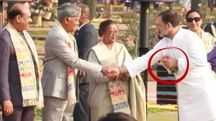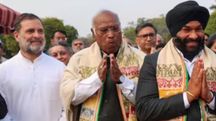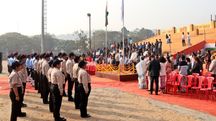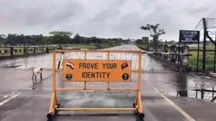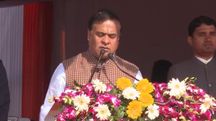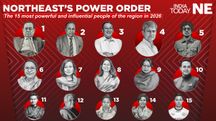Bodoland Territorial Council (BTC) election 2020: A Paradigm Shift in the politics of Bodoland?
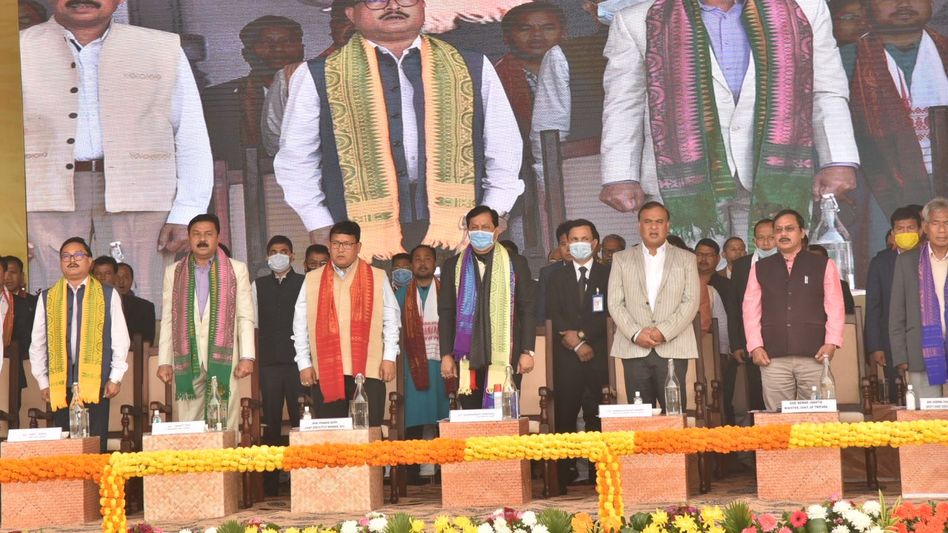 Swearing-in-ceremony of the newly elected members of the Bodoland Territorial Council. Photo:Twitter/@himantabiswa
Swearing-in-ceremony of the newly elected members of the Bodoland Territorial Council. Photo:Twitter/@himantabiswa
Over the past few weeks Assam witnessed an electrifying atmosphere leading up to the Bodoland Territorial Council (BTC) election in the north-western part of the state. One might think it was quite unusual for a council election to get so much coverage. Only, it was not. It drew the heavyweights of state politics for the election campaign and naturally drew attention of the people of the entire state. In the end, as anticipated, ‘change’ (or ‘Poriborton’ in Assamese) occurred.
The ‘change’ this time have brought a new face to politics. The United People’s Party Liberal (UPPL), Bharatiya Janata Party (BJP) and Gana Suraksha Party (GSP) coalition council sworn in on 15th Dec with Pramod Boro (UPPL) as the Chief Executive Member (CEM). Boro is a firebrand leader who spearheaded the Bodoland statehood movement as the president of the All Bodo Students Union (ABSU), a very influential Bodo organisation. His direct entry into politics as President of UPPL and subsequently as the CEM has brought a structural shift in the politics of Bodoland Territorial Region (BTR).
Saga of peace accords
The demand of separate statehood for Bodoland intensified from the late 1980’s. Subsequent emergence of Bodo militant outfits escalated violence in the region. The first attempt to solve the problem in the Bodo heartland was made in 1993 with the formation of Bodoland Autonomous Council (BAC) by the Hiteswar Saikia led government. Critics claim, it was a hastily made accord which gave free hand to the leaders of the BAC administration to indulge in corruption. The question of demarcating the boundaries of the BAC remained unsolved. The accord which was rejected by the Bodo Security Force (later became NDFB) outright was subsequently rejected by other Bodo leaders and organisations. The failure of the arrangement to fulfil the aspirations of the Bodo people led to the formation of the Bodo Liberation Tigers (BLT) in 1996 which intensified violence in the region. The Centre started the dialogue process in 1997 and after much conciliation the BLT suspended its activities from 1999. A Memorandum of Settlement (MoS) was signed after a three-year long tripartite talks, mediated by Rajesh Pilot, between the Centre, the Government of Assam and the BLT. The BTC was formed under the 6th Schedule of the Constitution on December 7, 2003 as envisaged in the MoS. The Council was primarily established for preservation of the identity, language, culture, tribal land rights, political aspiration, and upliftment of socio-economic conditions of the Bodos. The BLT leaders came overground and formed the Bodoland People’s Front (BPF). The party was given the ad-hoc responsibility to administer the BTC until the election was held. However, demand for statehood did not die down and the NDFB stayed away from dialogue. The 2020 Accord becomes important because it has been successful bringing the different NDFB factions to the table. Amit Shah has termed it as the final and comprehensive solution to the Bodo movement.
Administration of the Council
The BTC is an autonomous body which has administrative control over four districts (Udalguri, Baksa, Chirang and Kokrajhar) of north-western Assam which covers an area of 8970 sq. km. It receives funding from both the centre and the state government. It has legislative and executive power over 40 subjects. The new accord will add 12 additional subjects under its domain.
The Council has a total of forty-six members, out of which forty are directly elected by the people are six are nominated by the government. Portfolios are distributed among 15 Executive Members (EMs). The head of the council is the Chief Executive Member (CEM) who is assisted by the Deputy CEM.
Pre-election politics
The signing of the third Bodo Accord in January this year was in the backdrop of the scheduled election in April, 2020. Pramod Boro, a signatory of the Accord, who has supposedly brought the NDFB factions to the table for talks was given his share of credit upon the signing of the Accord. The UPPL hailed the Accord, which according to them will pave way for peace and development in the region. It also made way for BJP to strengthen its base in the region ahead of next year’s Assembly elections. BJP believes it is imperative to be a part of the council in order to consolidate its position in the region before next year’s Assembly election.
The BPF, since its inception has allied with the party that rules Dispur. For political reasons both the allies in State assembly, BJP and BPF, decided to contest the election independently. Hagrama Mohilary who came to power after the second Bodo Accord started disregarding the third Bodo Accord. Further splits between two parties began to occur when the administration of the Council was placed under Governor’s rule as elections scheduled on 4th April 2020 had to be deferred due to the pandemic. BPF had previously sought extension of their 5-year term by six months, but the BJP government favoured Governor’s rule instead. The Governor’s rule saw scrutinisation of several cases of corruption. These actions were allegedly taken at the state government’s behest. BJP made it its central issue in their campaign against BPF which indirectly favoured UPPL.
The BJP poured in its power and resources for the election. It engaged its top brass in the campaign. Its leaders went all out to highlight the issues of corruption and unfulfilled development promises of the previous council led by BPF. Leaders of both parties made scathing remarks on each other. The UPPL too attacked the BPF leadership on similar charges.
Post-poll developments
The election results came as a surprise. Proving the pundits wrong BPF emerged as single largest party with 17 seats. The BJP was not able to cause much dent in BPF which had won 20 seats in 2015 BTC election. However, the BJP managed to increase its tally from 1 seat in 2015 to 9 seat this time. UPPL won 12 seats and emerged as second largest party. Whereas, GSP and Congress won one seat each. Later wining candidate of Congress defected to BJP. AIUDF which won 4 seats in 2015 could not win even a single seat this time. Lack of enthusiasm of Congress and AIUDF leaders in campaigning reflected in the result sheet.
As the final tally became clear, the UPPL reached out to state BJP leaders without losing time to seek their support to form the council. BPF leader Hagrama Mohilary was, however, confident of forming the council and appealed BJP leaders to lend their support. As expected BJP dumped its ally BPF and supported UPPL and GSP to form the council. For the first time, BTR witnessed a coalition rule.
The BPF challenged the constitutional validity of the new council in the Gauhati High Court. The BPF claimed that the Governor, as constitutional head of BTC, should have invited the single largest party first to prove its strength in the council. The High Court sought a floor test on or before 26th December. The UPPL, BJP and GSP coalition won the floor test on 25th December. Not satisfied with the outcome, BPF-supremo Mohilary threatened to move the High Court again.
Decluttering the result
The UPPL, backed by ABSU, was able to turn heads before the polls as Pramod Boro and a string of ex-NDFB leaders joined the party ranks. However, the party failed to create as much impact as anticipated in the election. The main reason behind this could be its inability to attract the non-Bodo votes. Sensing its unannounced ties with the BJP the minority voters distanced itself from voting for the party. Writers travelled to various constituency of BTR in pre-poll phase and exchanged opinions with voters belonging from different communities.
The demography of BTR puts the Bodos in disadvantage. Parties are dependent on the non-Bodos which cover roughly seventy percent of BTR population. Experts believe that Bodo votes got divided between BPF and UPPL which makes the non-Bodo votes more important. Being backed by ABSU, UPPL has youth based support. The party’s promise to generate 5 lakhs self-employed jobs in 5 years in its election manifesto was able to attract large numbers of Bodo youth. The party, however, failed to read the adult Bodo minds.
Besides, the BPF was contesting against a number of odds. It was contesting against the BJP; the UPPL; anti-incumbency and massive corruption charges. Moreover, as the dates for the elections were not fixed, parties started campaigning after the lockdown restrictions were removed. This prolonged unofficial campaign went on of 8 months, which became difficult for the small regional party to sustain. Observers believe, BPF’s dismal performance in Udalguri and Baksa is because of the allegation of it being a Kokrajhar-centric party. It is alleged that a large proportion of development fund is spent on the district. In spite of the hurdles it emerged as the single largest party. Over time the BPF managed to build a political base among the non-Bodos who stayed back in BTR during the insurgency phase. They made an arrangement with the BPF in which they traded their votes for security of life and property. The Muslims this time voted for BPF to stop BJP from coming to power.
The Gana Suraksha Party (GSP) had hoped to become one of the largest party in the 2020 BTC Election. The party is led by Lok Sabha MP Naba Sarania (ex ULFA leader). The political differences between the Bodos and non-Bodos has helped Sarania successfully sail through the last two Lok Sabha elections. However, the BJP’s emergence in the BTC election came as a big blow to the newly formed party as BJP was able to secure the non-Bodo votes and GSP could manage to win just one seat. GSP will no longer seem appealing to the non-Bodo voters after it allied itself with UPPL to form the council. With BJP making inroads into the region the outcome of the next Lok Sabha election in Kokrajhar constituency will be very different from the past two elections.
BJP’s aspirations and betrayals
The BJP emerged as a biggest gainer in BTC election. The party contested in 26 seats and managed to win 9 seats and positioned itself as Kingmaker. BJP was successful in tapping the non-Bodo votes in Udalguri and Baksa. BJP saw it as imperative to be part of Autonomous Councils to consolidate its positioning in the North Eastern Region. So far it has been successful in projecting itself as an ally of the indigenous.
What’s good for BJP may not be good for its allies. It dumped BPF within four years. Its scheme of crowding out its allies after strengthening its base is uniform throughout the country. Proponents of regional parties fear that BJP’s encroachment into their space will be a setback for their regional aspirations. It gives rise to the anxiety of regional issues getting side-lined by the national politics. Some Bodo groups are concerned that UPPL led Council will actually be steered by the BJP and that local issues will be on the backburner. Regional parties such as The National People’s Party and Mizo National Front which enjoys the status of an ally of BJP for now must learn from the mistakes committed by JD (U), Akali Dal and Shiv Sena. So far BJP has been successful in maintaining its national politics and at the same time accommodating the smaller parties centred around ethnic identity. But given its aspiration of winning everything from the panchayat to the parliament regional parties might struggle to survive in the distant future.
ALSO READ: Assam govt issues guidelines for New year celebrations in Guwahati
What lies ahead for Bodo Politics?
The BTC election is declared as semi-final to the General Election in the state scheduled to be held next year. The BJP has made its presence felt in the region. Its emergence as a party with a strong base in the region will give it a bargaining chip to demand at least a few of the twelve constituencies for itself from its alliance partner in BTR. BJP has also been successful in luring senior Bodo leaders to the party, most notably Biswajit Daimary. It gives the party an impetus to make further inroads in the Bodo heartland. These developments will make significant impact on the Bodo political parties in the long run.
In the short run, Boro has a challenging task ahead of him. He has the duty of sensitising the bureaucracy which has long been a part of a system in which, as is widely regarded, corruption was an inherent part. He has the responsibility to ensure that funds are accounted for and does not leak into private hands. It also needs to be seen whether BJP gives him freedom to take decisions independently. Further he has to check on BJP’s mission of homogenising India’s religion and culture in the region. This is important because, the idea behind the Bodo movement was preserving its cultural heritage and ethnic identity. Will he be successful? Only time will tell.
Writers:
Deep Jyoti Mahanta and Partha Pratim Basumatary
(Both are alumnus of IIT Guwahati and have deep interest in political developments of North Eastern Region)
To support our brand of fearless and investigative journalism, support us HERE.
Download:
The Inside Northeast app HERE for News, Views, and Reviews from Northeast India.
Do keep following us for news on-the-go. We deliver the Northeast
Copyright©2026 Living Media India Limited. For reprint rights: Syndications Today

